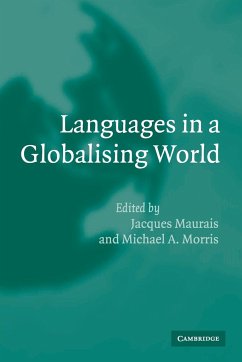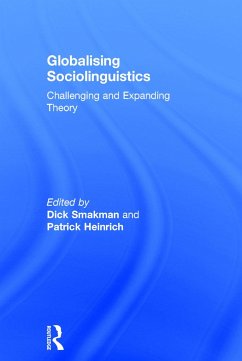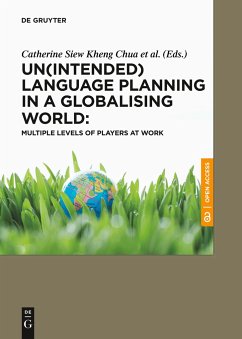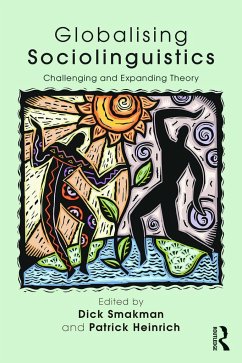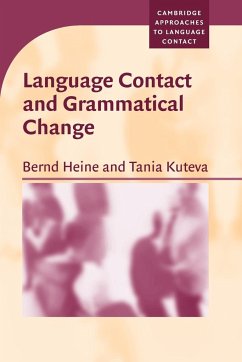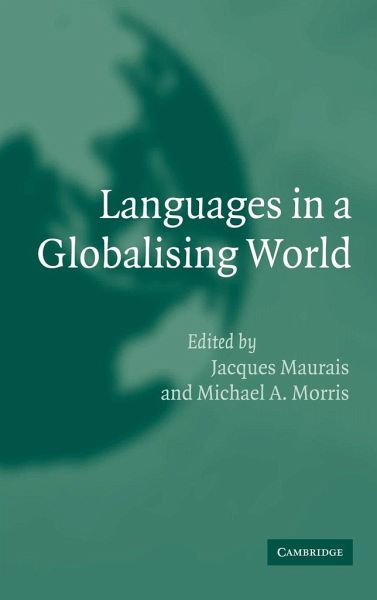
Languages in a Globalising World
Versandkostenfrei!
Versandfertig in 1-2 Wochen
69,99 €
inkl. MwSt.
Weitere Ausgaben:

PAYBACK Punkte
35 °P sammeln!
Considers the effects of present-day trends in global politics on the relative status of languages.Throughout human history, the fate of languages has been closely linked to political power relationships. Political shifts in the international system continue to affect linguistic patterns, which today are still in a state of flux following the end of the Cold War. This book considers the effects of present-day trends in global politics on the relative status of languages, and the directions in which the linguistic hierarchy might develop in the future. What are the prospects for the continuing ...
Considers the effects of present-day trends in global politics on the relative status of languages.
Throughout human history, the fate of languages has been closely linked to political power relationships. Political shifts in the international system continue to affect linguistic patterns, which today are still in a state of flux following the end of the Cold War. This book considers the effects of present-day trends in global politics on the relative status of languages, and the directions in which the linguistic hierarchy might develop in the future. What are the prospects for the continuing spread of English? Will other traditionally prominent languages such as French and German gain or lose influence? Will languages such as Arabic and Japanese increase in international status? Will minority languages continue to lose ground and disappear? The book assesses these prospects, looking at the major world regions, and with its interdisciplinary approach it will appeal to researchers and students of sociolinguistics and language planning as well as of international relations.
Table of content:
1. Introduction Jacques Maurais and Michael A. Morris; Part I. Global Communication Challenges: 2. Toward a new global linguistic order? Jacques Maurais; 3. The geostrategies of interlingualism Mark Fettes; 4. Language policy and linguistic theory Douglas A. Kibbee; 5. Babel and the market: geostrategies for minority languages Jean Laponce; 6. Forecasting the fate of languages William F. Mackey; Part II. Major Areas: 7. Language geostrategy in Eastern and Central Europe: assessment and perspectives Ferenc Fodor and Sandrine Peluau; 8. Languages and supranationality in Europe: the linguistic influence of the European Union Claude Truchot; 9. Regional blocs as a barrier against English hegemony? The language policy of Mercosur in South America Rainer Enrique Hamel; 10. Effects of North American integration on linguistic diversity Michael Morris; 11. Sociolinguistic changes in transformed Central Asian societies Birgit N. Schlyter; 12. Language and script in Japan and other East Asian countries: between insularity and technology Stefan Kaiser; 13. Sub-Saharan Africa Roland Breton; 14. Australasia and the South Pacific Richard B. Baldauf Jr. and Paulin G. Djité; Part III. Languages of Wider Communication: 15. The international status of the German language Ulrich Ammon; 16. Arabic and the new technologies Foued Laroussi; 17. Russian in the modern world Vida Io. Mikhalchenko and Yulia Trushkova; 18. Geolinguistics, geopolitics, geostrategy: the case of French Robert Chaudenson; 19. Toward a scientific geostrategy for English Grant McConnell; 20. On Brazilian Portuguese in Latin American Integration Maria da Graça Krieger; 21. Conclusion: the search for a global linguistic strategy Humphrey Tonkin.
Throughout human history, the fate of languages has been closely linked to political power relationships. Political shifts in the international system continue to affect linguistic patterns, which today are still in a state of flux following the end of the Cold War. This book considers the effects of present-day trends in global politics on the relative status of languages, and the directions in which the linguistic hierarchy might develop in the future. What are the prospects for the continuing spread of English? Will other traditionally prominent languages such as French and German gain or lose influence? Will languages such as Arabic and Japanese increase in international status? Will minority languages continue to lose ground and disappear? The book assesses these prospects, looking at the major world regions, and with its interdisciplinary approach it will appeal to researchers and students of sociolinguistics and language planning as well as of international relations.
Table of content:
1. Introduction Jacques Maurais and Michael A. Morris; Part I. Global Communication Challenges: 2. Toward a new global linguistic order? Jacques Maurais; 3. The geostrategies of interlingualism Mark Fettes; 4. Language policy and linguistic theory Douglas A. Kibbee; 5. Babel and the market: geostrategies for minority languages Jean Laponce; 6. Forecasting the fate of languages William F. Mackey; Part II. Major Areas: 7. Language geostrategy in Eastern and Central Europe: assessment and perspectives Ferenc Fodor and Sandrine Peluau; 8. Languages and supranationality in Europe: the linguistic influence of the European Union Claude Truchot; 9. Regional blocs as a barrier against English hegemony? The language policy of Mercosur in South America Rainer Enrique Hamel; 10. Effects of North American integration on linguistic diversity Michael Morris; 11. Sociolinguistic changes in transformed Central Asian societies Birgit N. Schlyter; 12. Language and script in Japan and other East Asian countries: between insularity and technology Stefan Kaiser; 13. Sub-Saharan Africa Roland Breton; 14. Australasia and the South Pacific Richard B. Baldauf Jr. and Paulin G. Djité; Part III. Languages of Wider Communication: 15. The international status of the German language Ulrich Ammon; 16. Arabic and the new technologies Foued Laroussi; 17. Russian in the modern world Vida Io. Mikhalchenko and Yulia Trushkova; 18. Geolinguistics, geopolitics, geostrategy: the case of French Robert Chaudenson; 19. Toward a scientific geostrategy for English Grant McConnell; 20. On Brazilian Portuguese in Latin American Integration Maria da Graça Krieger; 21. Conclusion: the search for a global linguistic strategy Humphrey Tonkin.





